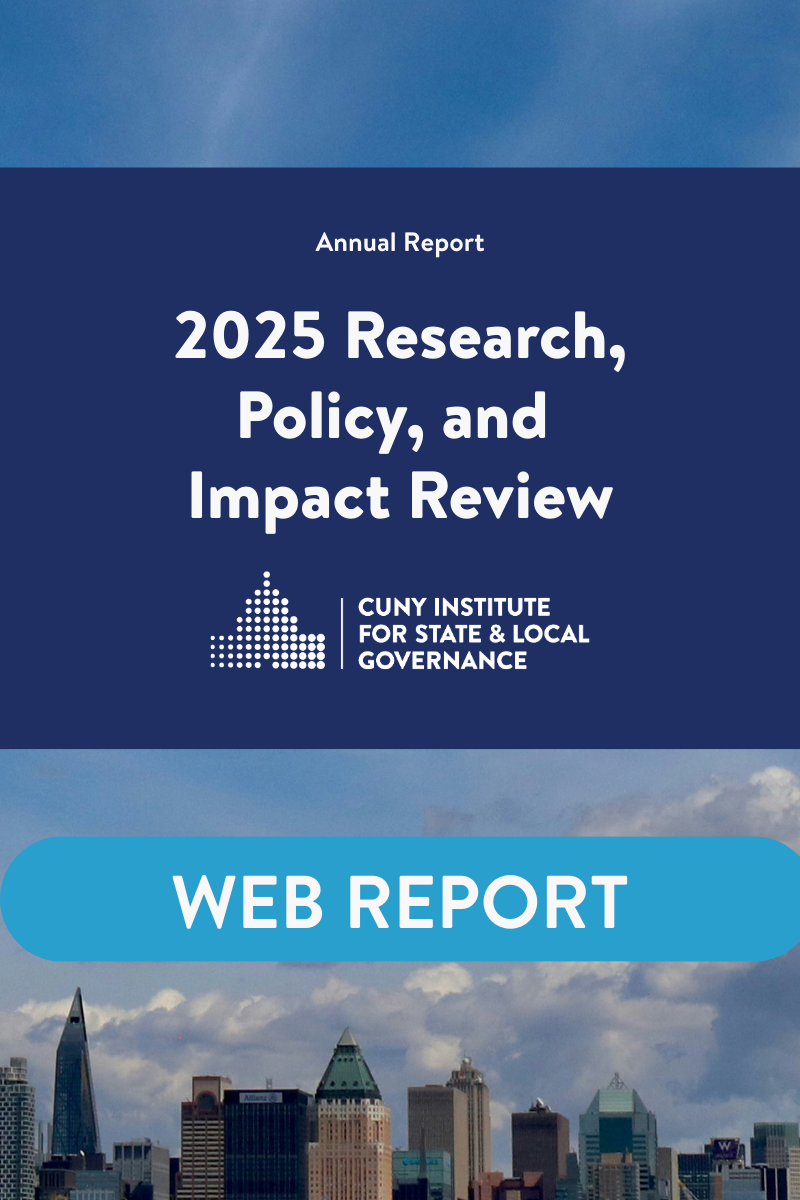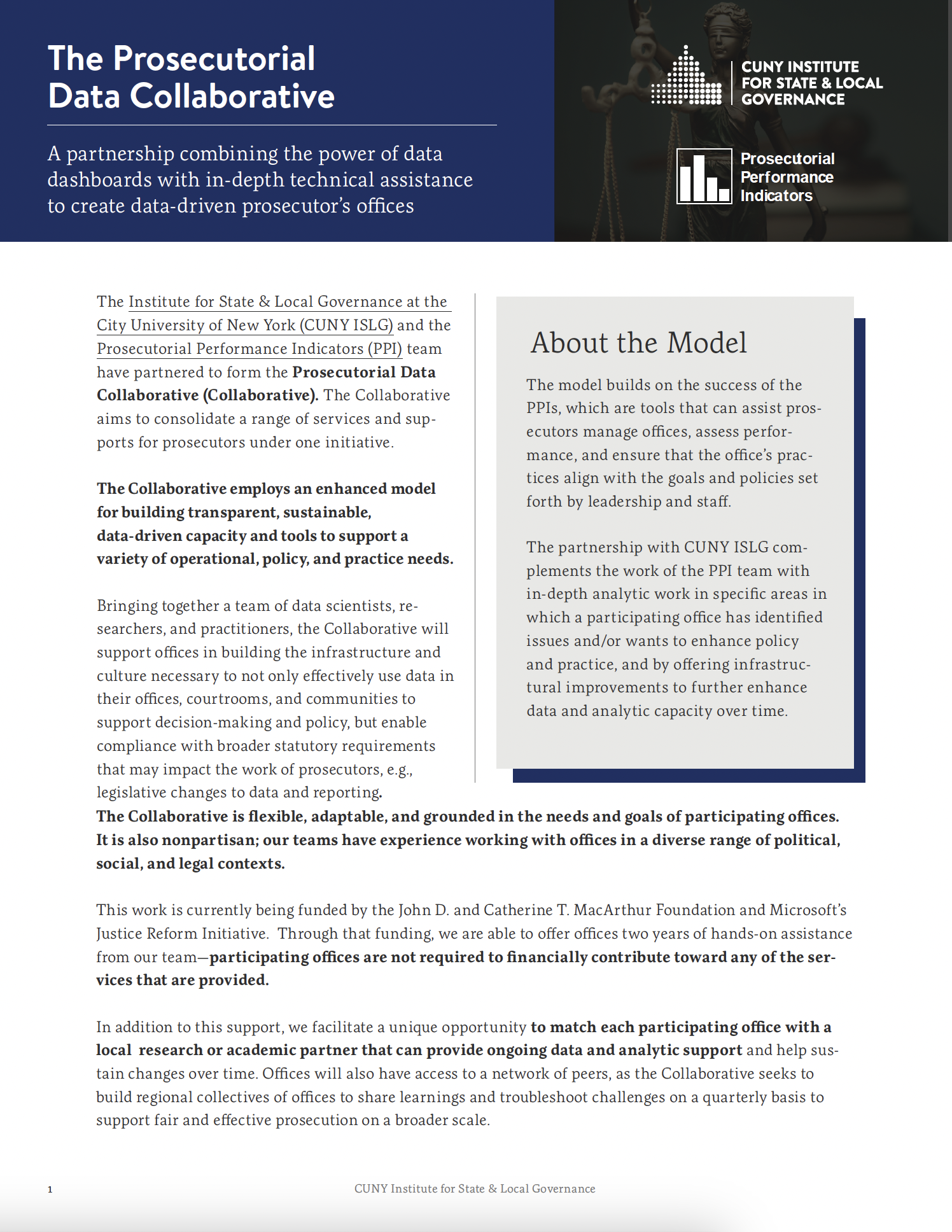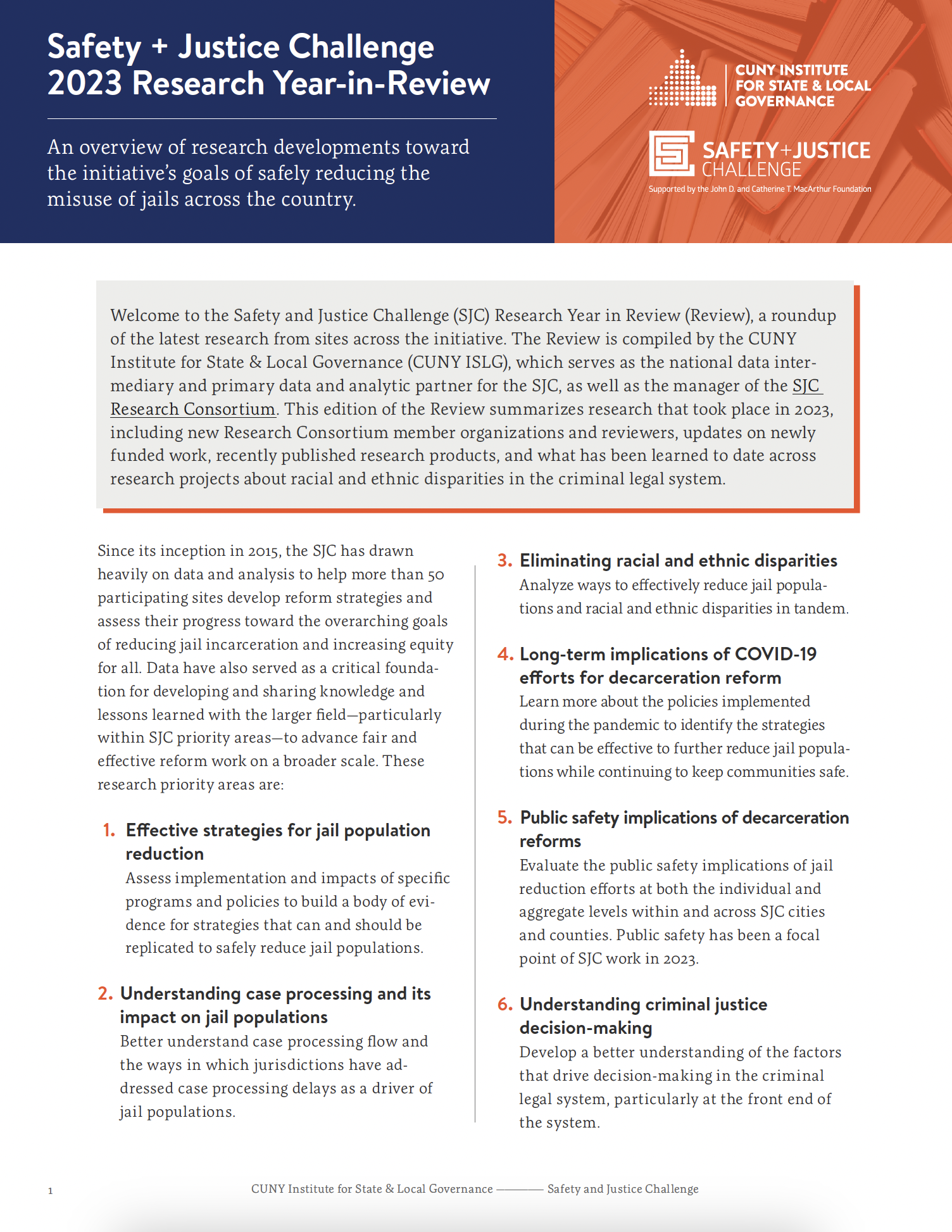RESOURCES
Knowledge Center
Outcomes, discoveries, and analysis from our breadth of good governance initiatives.
![[From Our Partners] The Impact of Jail Reduction Strategies on Community Safety](https://images.squarespace-cdn.com/content/v1/5fcea962a1b4d771ad256fcc/d94dfd64-1d7d-4f79-96bb-71f3e77bf49c/Impact+of+Jail+Reduction+Strategies+-+Full.png)
[From Our Partners] The Impact of Jail Reduction Strategies on Community Safety
As part of the SJC, New Orleans and Lucas County, Ohio, implemented tailored strategies to safely reduce jail populations, including a Public Safety Assessment. The Center for Justice Innovation examined whether the PSA managed to reduce jail populations without sacrificing community safety; they found that not only did it not increase crime, but recidivism rates generally decreased.

2025 Research, Policy, and Impact Review
This report captures not just some of what we produced in 2025, but how we worked—and why these approaches matter.

Ten Years of Advancing Safety and Justice: A Research, Policy, and Practice Insight Hub
The Hub connects practitioners and policymakers around the country with the research and tools they need to innovate and improve the fairness and effectiveness of pretrial and jail-related decision-making and outcomes.

Safety and Justice Challenge 2025 Research Year-in-Review
The Safety and Justice Challenge (SJC) Research Year-in-Review is a roundup of the latest research from sites across the initiative. The Review is compiled by CUNY ISLG, which serves as the primary data and analytic partner for the SJC, as well as the manager of the SJC Research Consortium. This edition of the Review summarizes research activities that took place throughout 2025, including updates on newly funded work, recently published research products, and work to synthesize findings across the SJC.
![[From Our Partners] Gatekeeping Justice: the Role of Communications Personnel in Shaping Public Safety](https://images.squarespace-cdn.com/content/v1/5fcea962a1b4d771ad256fcc/988b6282-6619-45a8-8912-98edbf9ac385/Screenshot+2025-11-03+140514.png)
[From Our Partners] Gatekeeping Justice: the Role of Communications Personnel in Shaping Public Safety
To learn more about decision-making processes among public safety communications professionals and influences on responding law enforcement officers, CUNY ISLG funded Arizona State University (ASU) and the University of Missouri-St. Louis (UMSL) through the Safety and Justice Challenge (SJC) to conduct a mixed methods study.
![[From Our Partners] New York City Health Justice Network Recidivism Evaluation Study](https://images.squarespace-cdn.com/content/v1/5fcea962a1b4d771ad256fcc/4c7942d9-5c6a-4cd4-80d5-3bcee559f83f/Screenshot+%2847%29.png)
[From Our Partners] New York City Health Justice Network Recidivism Evaluation Study
Through CJII funding, NYU-CUNY Prevention Research Center (PRC) conducted an outcome evaluation of the NYC Health Justice Network program. The final report findings offer preliminary evidence of NYC HJN’s ability to reduce future criminal legal system involvement among participants.

The Community-Based Restorative Justice Program: 2024-2025 Grantee Yearbook
This Yearbook was created to acknowledge a year’s worth of incredible work from the 16 Community-Based Restorative Justice program grantees during the End-of-Year Community Forum, a two-day gathering of grantees, philanthropy partners, and restorative justice practitioners on June 16th and June 17th, 2025.
![[From Our Partners] Changing the Initial Appearance Process in Three Sites](https://images.squarespace-cdn.com/content/v1/5fcea962a1b4d771ad256fcc/c1efac4e-4db5-4947-b37e-c8a8f1c77706/Changing+the+Initial+Appearance+Process+-+Findings+from+Three+Sites.png)
[From Our Partners] Changing the Initial Appearance Process in Three Sites
CUNY ISLG funded Justice System Partners (JSP) to conduct mixed-methods studies in Cook (IL), Lucas (OH), and Multnomah (OR) counties, where local defense agencies had led programs to systematically enhance due process for individuals at initial appearance.

A Blueprint for Social Service Navigation in NYC and Beyond
Drawing from a wealth of experience developing service navigation programs as well as research on data-informed, community-responsive approaches, this brief provides a guide to developing navigation programs that can help government and public institutions connect communities with care, creating safety and opportunity for all.

The Prosecutorial Data Collaborative
Bringing together a team of data scientists, researchers, and practitioners, the Collaborative supports state and local prosecutors in building the infrastructure and culture necessary to not only effectively use data in their offices, courtrooms, and communities to support decision-making and policy, but to enable compliance with broader statutory requirements.

Safety and Justice Challenge 2024 Research Year-in-Review
This edition of the Review summarizes research activities that took place throughout 2024, including new Research Consortium memberships, updates on newly funded work, and recently published research products, with a spotlight on women and survivors of violence in the criminal legal system.
![[From Our Partners] Evaluation of Emergency COVID-19 Jail Reduction Strategies in Multnomah County, Oregon](https://images.squarespace-cdn.com/content/v1/5fcea962a1b4d771ad256fcc/d6712efc-29a3-4358-8c48-a511473577a4/exec+summary.png)
[From Our Partners] Evaluation of Emergency COVID-19 Jail Reduction Strategies in Multnomah County, Oregon
To learn more about the impact of emergency COVID-19 measures on jail reduction efforts, and think about emergency measures that could continue in the post-pandemic era, CUNY ISLG funded JSP through the SJC to conduct a mixed-methods case study on the emergency jail population reduction strategies implemented in Multnomah County, Oregon.

Building Better Public Sector Data
This brief details how CUNY ISLG staff work with governmental agencies, nonprofit organizations, and other partners to effectively collect, maintain, and use data, especially in the face of time and resource constraints.

Building Strong Communities through Strategic Investments
Reflecting on the past decade of work, this model brief takes stock of these four CJII goals; discusses how DANY, CUNY ISLG, and other partners achieved them; and provides a blueprint for practitioners, researchers, policymakers, and funders.

From Research to Action to Successful Outcomes
The Reducing Revocations Challenge aimed to fill the void of information on drivers of revocation through in-depth, mixed-method research in 10 jurisdictions (Phase I) and use what was learned to identify and put into action innovative strategies to improve probation outcomes and equity in those outcomes in a subset of those sites.

Lowering Jail Populations Safely Before, During, and After COVID-19
Two years out from COVID-19’s peak, there continues to be no apparent correlation between changes in incarceration and violent crime. Most individuals released from jail on pretrial status did not return to jail custody, and local violent crime rates varied regardless of changes to the jail population—suggesting that jail reduction reforms can be implemented safely.

Safety and Justice Challenge 2023 Research Year-in-Review
This edition of the Review summarizes research that took place in 2023, including new Research Consortium member organizations and reviewers, updates on newly funded work, recently published research products, and what has been learned to date across research projects about racial and ethnic disparities in the criminal legal system.
![[From Our Partners] Achieving Racial Equity and Improving Culture in Jails Using a Community-Engaged Quality Improvement Process](https://images.squarespace-cdn.com/content/v1/5fcea962a1b4d771ad256fcc/d4cb1e94-8631-4ec2-9826-e131b58d5df7/Full+Report-+Methods+Report+-+Achieving+Racial+Equity+and+Improving+Culture+in+Jails.png)
[From Our Partners] Achieving Racial Equity and Improving Culture in Jails Using a Community-Engaged Quality Improvement Process
Research on conditions of confinement has historically been limited by a lack of access to the perspectives of individuals residing in jail. To understand the factors driving inequity in jail culture, CUNY ISLG funded Justice System Partners to partner with Wellbeing & Equity Innovations (WEI) to conduct a mixed-methods study in an SJC site using community-based participatory research methods.

Turning Local Data into Meaningful Reforms
In its eighth year, the SJC now supports a diverse network of more than 57 cities, counties, and states across the country in developing and implementing decarceration strategies. This report breaks down its the data-driven model of criminal justice reform, including what kinds of data were captured, how data were mobilized for change, and lessons learned when using administrative data for policy design and evaluation.
![[From Our Partners] Redefining Community Safety in Three US Counties](https://images.squarespace-cdn.com/content/v1/5fcea962a1b4d771ad256fcc/3cd6b9b1-8edd-47da-b9f6-2b8f48581788/Redefining+Community+Safety+report+cover.png)
[From Our Partners] Redefining Community Safety in Three US Counties
Research has uncovered that community safety cannot be treated in a one-size-fits-all manner, and conversations about safety should be locally oriented, bearing in mind the unique local contexts and nuances.
